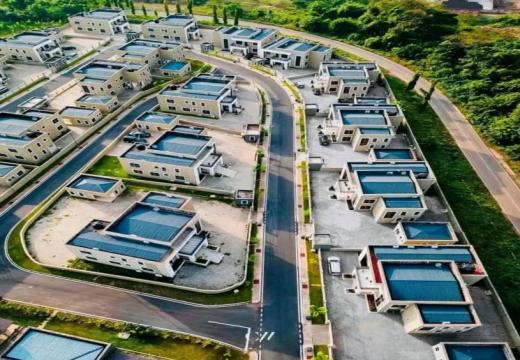A Comprehensive Guide To Residential Real Estate Investment In Ghana
A Comprehensive Guide To Residential Real Estate Investment In Ghana
- by PropHunt Admin
- On 03-06-2025
- at 3:02 PM

Investing in residential real estate is one of the most stable and rewarding ways to build long-term wealth, and Ghana’s property market presents unique opportunities for both local and diaspora investors. Residential real estate investing in Ghana will provide steady rental income, capital appreciation, and property value appreciation over time.
Understanding the dynamics of residential property investing can make the difference between profit and loss. In this guide, we’ll walk you through everything you need to know to confidently start or grow your residential real estate investments in Ghana. But all it requires is careful planning and understanding of the local market
What is Residential Real Estate Investment?
Residential real estate investment in Ghana centers around purchasing property intended for people to live in, such as single-family homes, apartments, duplexes, or townhouses. The primary motivations behind investing in these types of properties are twofold: the generation of consistent rental income through leasing agreements with tenants and the potential for significant capital appreciation.
However, the property's market value increases over a period of time, allowing for a profitable sale in the future. Successful residential real estate investment in Ghana requires careful consideration of various factors, including property location, local rental market demand, property management strategies, and economic trends influencing property values.
Why Invest in Residential Real Estate in Ghana?
Investing in residential real estate in Ghana comes with numerous benefits, and these are some of the reasons Ghanaian investors prefer residential real estate:
-
One of the main benefits of investing in residential real estate is the Cash Flow generation from rental income.
-
The long-term appreciation as property values rise is another unique benefit of investing in real property.
-
Investing in residential properties serves as an inflation hedge, as rental income and property values typically rise with inflation
-
Real estate investments are tangible assets you can leverage or sell
Types of Residential Real Estate Investments in Ghana
-
Single-Family Homes
-
Multi-Family Properties
-
Apartments/Flats
-
Short-Term Rentals
-
Student Housing
Key Steps To Invest in Residential Real Estate in Ghana
1. Set Clear Investment Goals
Before you dive into buying any property, it’s essential to define exactly why you're investing in residential real estate. Your goals will influence everything — from the type of property you buy to the location, financing strategy, and how you manage it. Without clear goals, you risk making decisions that don’t align with your long-term financial vision.
2. Understand Legal Processes
One of the most crucial and often overlooked steps in residential real estate investment in Ghana is understanding the legal framework. Many property disputes, scams, and losses occur simply because investors skip due diligence or fail to follow legal protocols. Investing without proper legal knowledge is like building a house without a foundation. Here’s how to legally protect your investment in Ghana’s real estate market:
3. Secure Financing
Real estate is capital-intensive, and one of the biggest hurdles for many aspiring investors in Ghana is how to fund their first or next property. Whether you're buying a plot to build on, a completed home, or an apartment for rental income, securing the right financing is essential to making your investment a reality — and keeping your cash flow healthy.
4. Run the Numbers
Before you sign any contract or make a payment on a property, you must analyse the financials thoroughly. Real estate is a business, and like any business, it only succeeds when the numbers make sense. Skipping this step can turn what looks like a great deal into a long-term liability. This process is often called “real estate deal analysis, and it helps determine if your investment is likely to be profitable or not.
5. Find Suitable Properties
You should work with a reputable real estate agent in Ghana with the necessary market knowledge and experience to help you find properties that meet your criteria and guide you through the transaction process. Sometimes, good investment opportunities are not publicly listed. So, working with local contacts and exploring off-market deals can be beneficial to you.
6. Conduct Due Diligence
Make sure you verify ownership and title of potential properties. You can do this by ensuring that the seller has clear and legal ownership of the property. Conduct a thorough title search at the Lands Commission to avoid future legal complications. Finally, you should carefully review the sales agreement, survey plans, and other legal documents with the help of a lawyer.
7. Negotiate the Purchase and Close the Deal
Depending on your market research, valuation, and due diligence findings, negotiate a fair purchase price with the seller. Once an agreement is reached, a formal sales agreement will be drafted and signed by both parties.
8. Manage Your Investment Property
Another hurdle has to do with the decision on property management. You have to decide whether you will manage the property yourself or hire a property management company in Ghana. If your goal is rental income, you will need to find suitable tenants and establish a system for collecting rent, tracking expenses, and managing the financial aspects of your investment.
9. Monitor Your Investment and Adapt
This final step involves tracking your property's performance and regularly monitoring your rental income, expenses, and property value. However, don’t forget to keep abreast of developments in the local real estate market and adjust your strategy as needed. As your investment grows, you may explore opportunities to expand your portfolio.
Conclusion
Investing in residential real estate in Ghana offers significant potential for wealth creation. By following these steps, conducting thorough research, and seeking professional advice when needed, you can increase your chances of making successful and profitable real estate investments in the Ghanaian market. Remember that patience, due diligence, and a long-term perspective are key to achieving your investment goals.

 French
French




